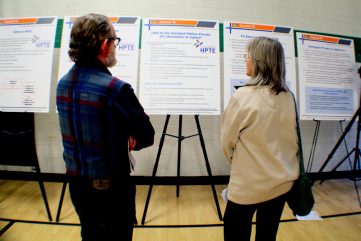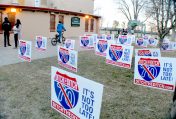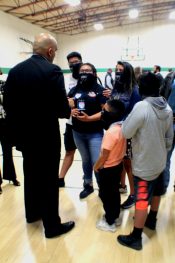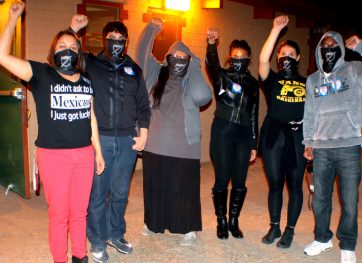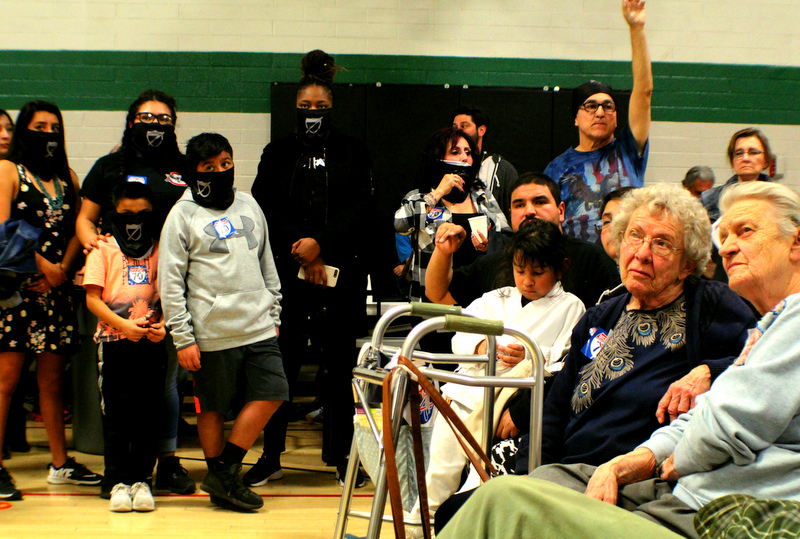
Area residents wear handkerchiefs with the symbol for the Ditch the Ditch campaign. The symbol has been adopted by those opposed to the I-70 expansion project. (all photos: Miriam Mimi Madrid/The Nation Report)
By Miriam Mimi Madrid
Around 35 residents from Globeville Elyria, and Swansea (GES) took over a Colorado Department of Transportation (CDOT) community presentation at the Swansea Recreation Center on Feb. 16, 2017 in opposition to the $1.2 billion plan to expand Colorado Highway I-70.
Representatives of the Colorado Department of Transportation organized the meeting to inform community members of the upcoming scheduling and process of the project after receiving a signed Record of Decision (ROD) from the Federal Highway Administration (FHWA) in mid-January 2017.
The CDOT presentation did not go as planned when community members including elders and young people wearing black bandanas that read ‘Ditch the Ditch’ brought their own speaker and microphone to express their opposition. Not everyone in the audience was in opposition but the overwhelming majority was.
Candi CdeBaca, a Swansea resident, told the audience in the packed gymnasium that CDOT was in the process of selecting a private company to undertake the development of the project. “Whichever contractor gets the deal, they better be prepared to lose time, money and credibility. Because we are here ready to resist by any means necessary,” she said.
About 30 minutes of testimony was given by the group which included concerns about the health of residents including children, air pollution, financing of the project, civil rights injustices and questioning of the overall purpose of the project. At one point the facilitator asked the demonstrators to remove their masks in which CdeBaca responded, “The masks are a representation of the pollution we’re protecting ourselves from.”
An undisclosed audience member called the police saying they felt intimidated by the residents in their face covers. When a Public Information Officer from Denver Police Department was reached over the phone she said police officers were dispatched to Swansea Recreation Center to answer a disturbance call. Seven patrol cars and SUV’s were parked throughout the night as residents continued to voice their opposition to the project.
The gymnasium became tense with heated exchanges shortly after the floor was opened for the audience to ask questions directly to Shailen Bhatt, Executive Director of CDOT.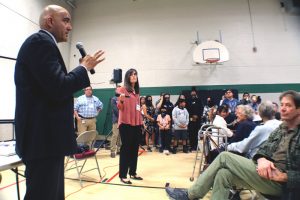
“I wanna be very clear. We aren’t here tonight to say we are going to move the project. We are not going to agree with that. That’s not what we are here to discuss,” said Bhatt
The $1.2 billion Central 70 Project plans to widen, fully reconstruct, and re-strip sections of I-70 stretching from Chambers Road to Highway I-25. Approximately 1,200 businesses located alongside the corridor as well as residents living in Northeast Park Hill, Globeville, Elyria-Swansea, Caffee Park, Jersey Park, Cole, Clayton and City Park neighborhoods, among others will be impacted. Traffic congestion is expected to increase during construction as well.
Lamon Knowles, of the group City Park Friends and Neighbors said that 433 of its members are completely opposed to this project and stand in solidarity with their neighbors. She added that about a year ago they did not know how their struggles were connected between City Park and GES but now vows to fight this project together.
Many of the concerns brought by residents were about the fear of digging up Superfund and Brownfield sites during construction. Superfund sites are contaminated locations where the federal government has designated to fund the cleanup of hazardous substances and pollutants. Similarly, brownfield properties are open for expansion, redevelopment or reuse, but have been complicated by the presence or potential presence of hazardous substances, pollutants or contaminants.
Milo Marquez, a 4th generation Northeast Denver resident and father, said he wasn’t there to say the highway is an inconvenience but instead to implore supporters to fight with him for the safety and health of his community. “Help us fight for our children who are going to school in Swansea Elementary, Garden Place and Bruce Randolph right in the middle of a Superfund site,” Marquez said.
Residents in opposition to the I-70 expansion say that the construction will add pollution to the nation’s already most polluted zip code, 80216. According to the Environmental Protection Agency’s website contaminants of concerns exist near Vasquez Boulevard and I-70 including arsenic and lead. Approximately 10 Brownfields and four Superfund sites exist throughout the neighborhoods that the Central 70 Project will impact.
Ed Armijo, Vietnam veteran and long-time resident of Swansea, told Bhatt, “I’m concerned with the elders and young kids, because you are going to end up poisoning them. Then, when it happens and it’s too late you are gonna say you didn’t know about it.”
Last March 2016, residents and environmental groups filed a federal lawsuit against the EPA claiming they violated the National Ambient Air Quality Standard during their study for the project. Bhatt encouraged any group to come forward and challenge their case through lawsuits saying that this is the American process.
“We don’t build roads like they do in China. I don’t just get to come in and say I’m taking this property,” he said. Bhatt assured the audience that CDOT will abide by any court decision that says they are in the wrong.
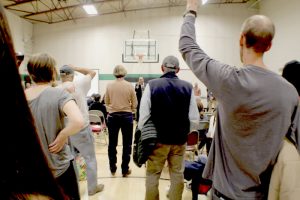 Someone in the back of the room shouted, “Do what’s moral, not just what’s legal!”
Someone in the back of the room shouted, “Do what’s moral, not just what’s legal!”
Laurie Simonson, 3rd generation Coloradan, questioned the real purpose behind the project. After reading the Environmental Impact Statement (EIS) authored by CDOT she deduced that the purpose of the project was basically to reduce congestion on the highway. Simonson said she had read enough books to know that increasing the width of a freeway actually increases demand. “I bet you my car that it is not going to reduce congestion on I-70,” she said to Bhatt.
Bhatt said he agreed with her in regards to the concept of induced demand. He explained that the project might not reduce congestion but will expand the capacity of a highway built for 3 million people in 1980 to serve a projected population of 8 million residents within the next 20 years.
The group of activists compared their struggle to those of Standing Rock and Flint Michigan where politics, health and environmental concerns, land, water and resident voices intersect. Jane Jacobs who was an activist in New York and helped stop an eight-lane highway in Lower Manhattan about 50 years ago was mentioned as inspiration of other communities who had successfully stopped projects similar to the Central 70 Project.
“We are part of a national movement for liberation and equity right here in Denver and Colorado,” said CdeBaca.
Drew Dunter, an Elyria resident, said none of his neighbors support the project but that most have given up hope. Dunter was part of neighborhood meetings and collaboration teams working with CDOT up until 2012. He believes that elected and appointed city leaders including Rep. Albus Brooks and Mayor Michael Hancock have betrayed the citizens of Globeville and Elyria-Swansea. “The political betrayal by our city leaders is a scandal,” Dunter said.
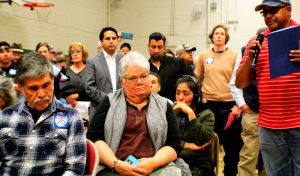 While many City Council members including Rafael Espinoza, Debbie Ortega, Paul Lopez and Paul Kashmann all support the efforts of residents, they have suggested the group take their fight to State Representatives as they have more power to influence the state project.
While many City Council members including Rafael Espinoza, Debbie Ortega, Paul Lopez and Paul Kashmann all support the efforts of residents, they have suggested the group take their fight to State Representatives as they have more power to influence the state project.
Colorado State Representative Joe Salazar and House Speaker Crisanta Duran were in attendance of the meeting. House Rep. Duran said she was there to listen to concerns and thoughts to make sure that Globeville Elyria and Swansea can continue to be a wonderful place to live in the city.
After the Q&A session a group of six young people including Nancy Palacios and her younger siblings confronted Bhatt. Palacios said through tears that she lived in the neighborhood while Bhatt got to go to his home far away from pollution. “They aren’t really listening or thinking of the future generations.” she said.
Rebecca White, the I-70 East Communications and Public Affairs Manager said that CDOT had done its due diligence in allowing residents to express their frustrations and anger in this meeting like hundreds of others that have been hosted in the past 14 years.
“We’ve studied the reroute we are not entertaining that anymore. That’s not a topic we are going to talk a lot about, we are focusing on where the project is now,” White said.
The $1.2 billion projected is scheduled to begin construction in 2018.

